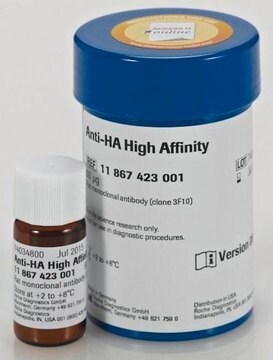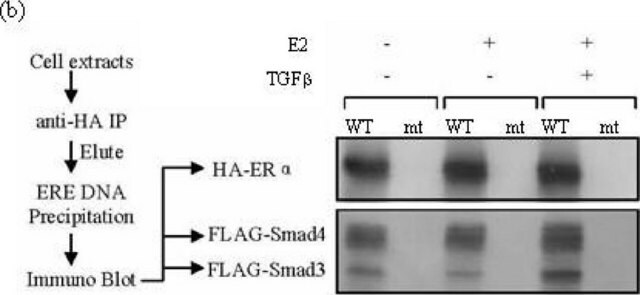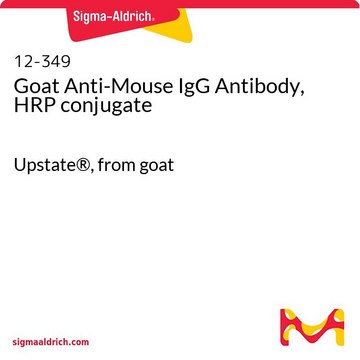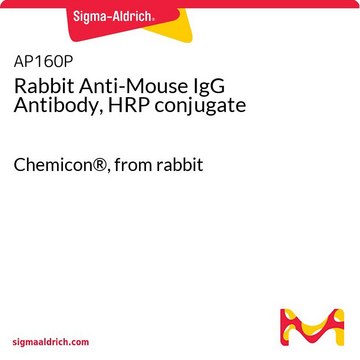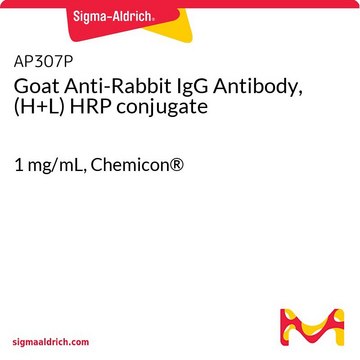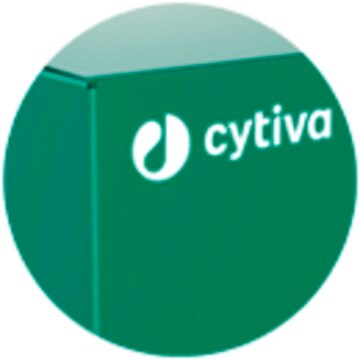SAB3701083
Anti-Mouse IgG (H+L)-Peroxidase antibody produced in rabbit
affinity isolated antibody, lyophilized powder
Synonym(s):
HRP
Sign Into View Organizational & Contract Pricing
All Photos(1)
About This Item
UNSPSC Code:
12352203
NACRES:
NA.46
Recommended Products
biological source
rabbit
Quality Level
conjugate
peroxidase conjugate
antibody form
affinity isolated antibody
antibody product type
secondary antibodies
clone
polyclonal
form
lyophilized powder
species reactivity
mouse
technique(s)
immunohistochemistry: suitable
indirect ELISA: suitable
western blot: suitable
shipped in
wet ice
storage temp.
2-8°C
target post-translational modification
unmodified
Related Categories
General description
Immunoglobulin G (IgG) belongs to the immunoglobulin family and is a widely expressed serum antibody. It consists of a γ heavy chain in the constant (C) region. The monomeric 150kDa structure of IgG constitutes two identical heavy chains and two identical light chains with molecular weight of 50kDa and 25kDa, respectively. The primary structure of this antibody also contains disulfide bonds involved in linking the two heavy chains, linking the heavy and light chains and resides inside the chains. IgG is further subdivided into four classes namely, IgG1, IgG2, IgG3, and IgG4 with different heavy chains, named γ1, γ2, γ3, and γ4, respectively. Limited digestion using papain cleaves the antibody into three fragments, two of which are identical (called Fab fragments) and contain the antigen-binding activity. The third fragment (called Fc fragment) does not possess antigen-binding activity, but binds to cells and effector molecules. Pepsin cleaves the carboxy-terminal side of the disulfide bonds in the general region of the antibody and this gives rise to the F(ab′)2 fragment. The two antigen-binding arms of the antibody are linked in this fragment. Maternal IgG is the only antibody transported across the placenta to the fetus. It passively immunizes the infants.
Specificity
This product was prepared from monospecific antiserum by immunoaffinity chromatography using Mouse IgG coupled to agarose beads. Assay by immunoelectrophoresis resulted in a single precipitin arc against Anti-Peroxidase, Anti-Rabbit Serum, Mouse IgG and Mouse Serum.
Immunogen
Mouse IgG whole molecule
Physical properties
Antibody format: IgG
Physical form
Supplied in 0.02 M Potassium Phosphate, 0.15 M Sodium Chloride, pH 7.2 with 10 mg/mL Bovine Serum Albumin (BSA) - Immunoglobulin and Protease free
Reconstitution
Reconstitute with 1.0 mL deionized water (or equivalent).
Disclaimer
Unless otherwise stated in our catalog or other company documentation accompanying the product(s), our products are intended for research use only and are not to be used for any other purpose, which includes but is not limited to, unauthorized commercial uses, in vitro diagnostic uses, ex vivo or in vivo therapeutic uses or any type of consumption or application to humans or animals.
Not finding the right product?
Try our Product Selector Tool.
Choose from one of the most recent versions:
Certificates of Analysis (COA)
Lot/Batch Number
Don't see the Right Version?
If you require a particular version, you can look up a specific certificate by the Lot or Batch number.
Already Own This Product?
Find documentation for the products that you have recently purchased in the Document Library.
Customers Also Viewed
Tamer Y Mahmoud et al.
Parasitology research, 113(12), 4513-4523 (2014-10-01)
Despite the wide current use of praziquantel (PZQ) in treatment of schistosomiasis, low cure rates have been recorded in many studies. The aim of this study was directed to evaluate the curative effect of propolis (Pps) alone or in combination
Saar Tal et al.
Virology, 468-470, 631-636 (2014-10-14)
The P4 promoter of the autonomous parvovirus Minute Virus of Mice (MVM) drives the production of its non-structural proteins, NS1 and NS2. The NS2 isoforms are without enzymatic activity but interact with cellular proteins. While NS2 is crucial to the
Janeway CA
Immunobiology (2001)
C S Pinheiro et al.
Parasite immunology, 36(7), 303-312 (2014-04-23)
Schistosoma mansoni is a blood fluke parasite responsible for schistosomiasis. The best long-term strategy to control schistosomiasis is through immunization combined with drug treatment. In this study, we cloned, expressed and purified SmTSP-2 fused to the N- and C-terminal halves
Ranadhir Dey et al.
Journal of immunology (Baltimore, Md. : 1950), 193(7), 3513-3527 (2014-08-27)
Previously, we showed that genetically modified live-attenuated Leishmania donovani parasite cell lines (LdCen(-/-) and Ldp27(-/-)) induce a strong cellular immunity and provide protection against visceral leishmaniasis in mice. In this study, we explored the mechanism of cross-protection against cutaneous lesion-causing
Our team of scientists has experience in all areas of research including Life Science, Material Science, Chemical Synthesis, Chromatography, Analytical and many others.
Contact Technical Service


